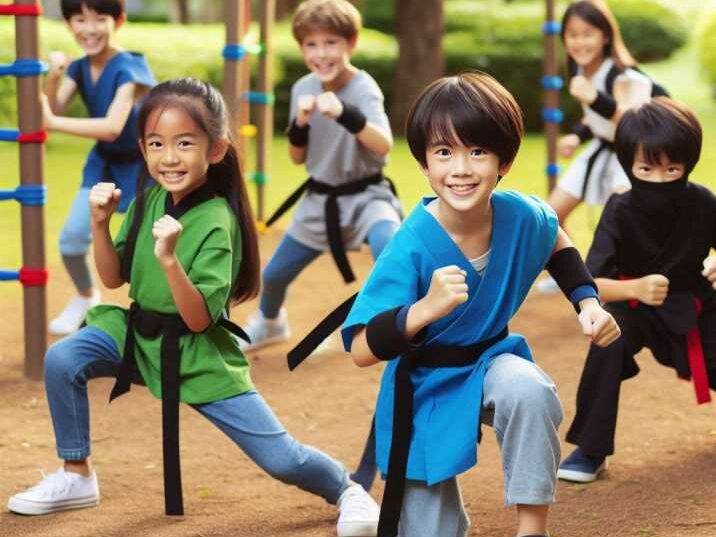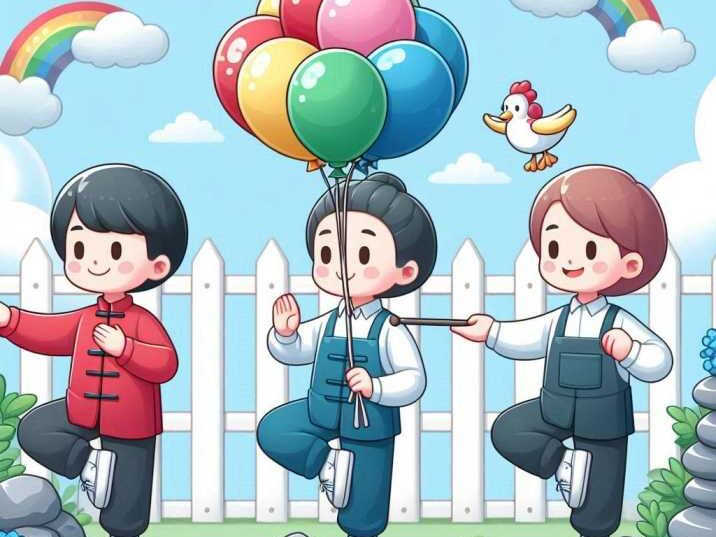Introduction
Table of Contents
Martial arts isn’t just about serious training—it can also be a lot of fun, especially for kids! In this article, we’ll dive into the world of games with martial arts elements. These games not only entertain but also teach valuable skills like focus, coordination, and discipline. Whether you’re a parent, educator, or simply curious about martial arts-inspired activities, you’ll find plenty of ideas here to engage young learners.
Games with Martial Arts: Exploring Fun and Learning
1. Ninja Tag
Ninja Tag is a popular game that combines stealth and agility, inspired by ninjutsu techniques. Players must move quietly and swiftly to tag opponents without being seen or heard. It teaches kids to be aware of their surroundings and enhances their reflexes.

2. Karate Obstacle Course
Create a Karate Obstacle Course where participants must perform various karate moves to navigate through challenges like jumping over “walls” (mats or cushions), breaking boards (cardboard or foam), and kicking through hanging obstacles (pool noodles). This game builds strength, flexibility, and problem-solving skills.
Setting Up the Course:
- Materials Needed:
- Mats or cushions
- Cardboard or foam boards
- Pool noodles
- Timer for tracking performance
How to Play:
- Participants navigate the course using karate moves.
- Time each participant’s performance to add a competitive edge.
3. Sumo Wrestling
Sumo Wrestling adapted for children involves wearing padded suits and trying to push or throw opponents out of a designated ring. It promotes balance, strategy, and sportsmanship.
Equipment Required:
- Sumo Suits: Padded suits that resemble traditional sumo attire.
- Ring: A marked area where participants wrestle.
Rules:
- The first wrestler to step outside the ring or touch the ground with any body part other than their feet loses.
4. Tai Chi Balloon Balance
Tai Chi Balloon Balance combines the graceful movements of Tai Chi with the challenge of balancing balloons. Participants perform Tai Chi forms while keeping balloons in the air using controlled movements. This game enhances concentration and coordination.
Setup:
- Balloons: Use helium-filled balloons tied with ribbons for easy movement.
- Tai Chi Forms: Simplify Tai Chi movements suitable for children.
Objective:
- Keep the balloons in the air throughout the Tai Chi routine.

Table: Summary of Games with Martial Arts
| Game | Description | Skills Developed |
|---|---|---|
| Ninja Tag | Stealthy tagging game inspired by ninjutsu techniques | Agility, stealth, awareness |
| Karate Obstacle Course | Course requiring karate moves to navigate challenges | Strength, flexibility, problem-solving |
| Sumo Wrestling | Sumo-style wrestling with padded suits | Balance, strategy, sportsmanship |
| Tai Chi Balloon Balance | Tai Chi movements with balloon-balancing challenge | Coordination, concentration |
Conclusion
Incorporating martial arts into games not only makes learning enjoyable but also instills important values such as discipline, respect, and teamwork. These activities provide a holistic approach to physical fitness and mental well-being for children. Whether at home, in school, or at a martial arts studio, these games can enrich young minds and bodies alike.
FAQs about Games with Martial Arts
- What are the benefits of playing games with martial arts?
- Games with martial arts promote physical fitness, coordination, discipline, and mental focus in children.
- How can I introduce martial arts games to my child’s school?
- Talk to school administrators or physical education teachers about integrating martial arts-inspired activities into recess or PE classes.
- Are these games safe for young children?
- Yes, with proper supervision and appropriate safety measures, these games are designed to be safe and enjoyable for kids.
- Can martial arts games help with self-discipline?
- Yes, participating in structured martial arts games can teach children self-discipline through consistent practice and adherence to rules.
- What age group are these games suitable for?
- These games can be adapted for various age groups, typically starting from preschool age up to early teens.


